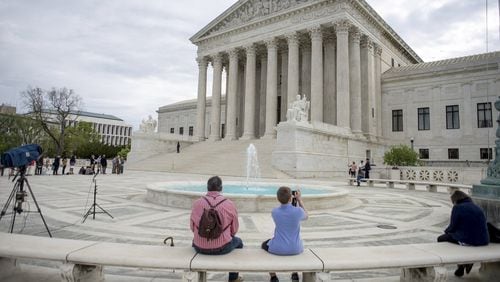Georgia and its neighbors to the south and west have tussled over water rights for the better part of the past three decades, piling up tens of millions of dollars in legal fees but finding few drops of clarity.
The U.S. Supreme Court will wade into the tri-state water wars for the first time Monday, weighing in on an epic turf battle with vast implications over the states’ economies, ecosystems and agriculture.
But few observers expect a quick resolution to what one expert calls the "emblem of Sisyphean water conflict in the eastern United States."
The nine justices will hear oral arguments in a case Florida brought against Georgia five years ago.
Florida alleges that thirsty metro Atlanta and southwest Georgia farmers pulled so much water out of the Apalachicola-Chattahoochee-Flint river basin — which originates in North Georgia, feeding Lake Lanier and flowing down the Alabama border to the Florida panhandle — that it hastened the collapse of the oyster industry in Apalachicola Bay.
Florida has asked the high court to impose on Georgia strict water consumption limits at roughly 1992 levels, when metro Atlanta was home to only half as many people as it is today, in order to preserve downstream water flow.
Georgia officials have argued that the state's consumption has been reasonable and that capping water usage would have a devastating impact on the state's economy, costing some $18 billion. They have asked for the suit to be dismissed.
Monday's hourlong oral arguments will give both Florida and Georgia a chance to respond to recommendations a court-appointed legal expert known as a special master made to the justices last year after a five-week trial.
In his findings, Ralph Lancaster Jr. excoriated Georgia for not being a more responsible steward of its water, particularly with regard to agriculture. But he also effectively sided with Georgia, urging justices to dismiss the suit because Florida couldn’t prove that limiting Georgia’s water usage would provide relief downstream, particularly during a period of drought.
Both Georgia and Florida have already outlined their arguments in legal briefs filed last summer.
The latter plans to argue that justices should spurn the special master’s recommendation and pave the way for the so-called “equitable apportionment” of the river basin’s water since Lancaster found injury at the hands of Georgia.
Georgia stakeholders feel that momentum is on their side following Lancaster's ruling, as well as the release of a new water distribution manual from the U.S. Army Corps of Engineers that effectively granted metro Atlanta all the water it needs from the Chattahoochee River and Lake Lanier through 2050. The state's lawyers will argue that the court should heed Lancaster's recommendations and drop Florida's case.
Georgia’s lawyers plan to cede some of their argument time to the U.S. Solicitor General’s Office, which is not a party to the case but represents interested federal agencies such as the corps. The corps manages five dams and several reservoirs in the Apalachicola-Chattahoochee-Flint river basin.
Lancaster implied in his February recommendations to the court that Florida made a grievous tactical error by not including the corps as a party to the lawsuit.
The feds argue in their brief to the justices that without the corps formally involved, capping Georgia's water usage would not provide Florida any relief. They said any changes to the corps' water plans should be done administratively and not through the courts.
The offices of Attorney General Chris Carr and Gov. Nathan Deal, who has shifted more than $30 million in the state budget to pay for this particular legal fight with Florida, declined to comment.
Alabama is not a party to this specific case but has been nervously watching from the sidelines. It has frequently sided with Florida over the years.
Justices’ questions
Observers were not clear on what exactly the Supreme Court justices would focus on during the oral arguments. Water apportionment cases are relatively rare for the court, and this particular case marks the first time the justices will be getting involved in the Southeastern water wars.
"Anytime the U.S. Supreme Court speaks on this topic, it has ripples across the whole U.S.," said Lara Fowler, a professor of water law at Penn State University who has published her own analysis of the Georgia-Florida case.
Some observers said they expect the justices to take a much broader look at the water battle and focus mainly on establishing a legal framework for future cases.
Justices could focus, for example, on to what degree prosecuting states should have to prove harm at the hands of another or what the standard should be for determining a remedy that could actually alleviate a state’s water problems.
Specifically for Georgia and Florida, the justices could choose to accept or reject Lancaster’s recommendation. They could also direct the special master or a lower court to re-examine the case through certain legal lenses. Historically, water rights cases have been less partisan affairs.
Many local stakeholders said they expect Georgia to be well-positioned because of Lancaster’s recommendation.
“I think Georgia’s confidence is well-placed for the Supreme Court’s ultimate decision because (the justices) have a long history of deferring to special master recommendations,” said Kevin Jeselnik, the general counsel for Chattahoochee Riverkeeper, a conservation group.
Others warned that because Lancaster essentially handed Georgia a win on a technicality since the corps was not a party to the case, the Peach State should not breathe too easily in this or future battles.
Florida could always turn around and refile the case, or it or Alabama could bring a new suit that adheres to the standards ultimately set by the Supreme Court or that rests on other legal underpinnings. Several other cases are already making their way through the legal system.
“Georgia is likely to prevail at this point, but I would not be surprised in the next (few) years if you see another challenge here where the corps is included,” said Ryan Rowberry, a Georgia State University law professor who counseled Florida in previous regional water battles. “I think Georgia has some serious work to do if they want to actually show they are doing conservation measures and other types of equitable apportionment principles.”
Georgia has already begun ramping up water conservation efforts, a point the state and its allies have made in court.
The Metropolitan North Georgia Water Planning District, a group of Atlanta-area cities and counties created by the Georgia General Assembly to map out water use for the region, says water demand has fallen by more than 10 percent since 2001, even as the area’s population has increased by more than 1 million people.
But Gil Rogers, the Atlanta-based director of the Southern Environmental Law Center’s Georgia and Alabama office, said Georgia should use the Supreme Court case as an opportunity to “look hard at this river system, to think hard about how better to conserve water both in metro Atlanta and in southwest Georgia, where there’s so much pressure from irrigation on the river and on the groundwater.”
The Georgia-Florida skirmish is the second of two interstate water cases the justices are scheduled to hear Monday. The other is between New Mexico and Texas over an agreement the two signed regarding the Rio Grande’s waters.
That suit is significantly different from the Southeastern case since the governors of Georgia, Alabama and Florida have been unable to strike such a compact, despite Lancaster’s pleas that the parties work out their differences outside of the court system.
The questions raised during the Rio Grande case, however, could have an impact on the justices in the Southeastern suit since it is being argued immediately beforehand.
The stakes are incredibly high, and not just for Georgia and Florida. The justices could help set the precedent for how states east of the Mississippi River, which traditionally have not had to grapple with the same water issues as the West, divvy up an increasingly rare commodity — river water — in a warming climate.
The Supreme Court is not the only battlefront in the Southeast’s never-ending water wars.
Across the street on Capitol Hill, lawmakers from Alabama and Florida have sought in recent years to insert language into must-pass legislation that would compel federal agencies to investigate Georgia’s water usage.
Georgia lawmakers have beaten back such attempts in recent years, but the political landscape could change in the coming years. Alabama Republican Richard Shelby is in line to become chairman of the powerful Senate Appropriations Committee. That perch would give him virtually unparalleled power, through Congress’ control of the purse, to direct agencies to use their regulatory and investigative powers against Georgia.
Never miss a minute of what’s happening in Georgia Politics. Subscribe to PoliticallyGeorgia.com.
About the Author








